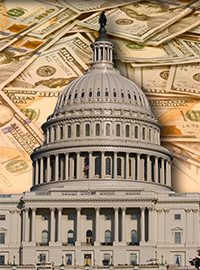| Politicians Make a Mockery Out of 'Emergency' Spending |
 |
|
By Veronique de Rugy
Thursday, August 24 2023 |
Remember how, mere months ago, the debt-ceiling deal struck between Democrats and Republicans to avoid a government shutdown was touted as "an historic first step toward shifting government back toward common sense and conservatism?" The hope was that the spending caps in the deal would actually constrain spending. Well, it took less than two months for politicians to start evading the caps with an old trick: emergency spending. In theory, there's nothing wrong with emergency spending. Rarely does a year pass without some unforeseen event requiring prompt access to federal funds. The supplemental spending process provides funding that cannot wait until the next appropriations cycle. When unexpected disasters strike, Congress should be able to deploy needed spending in a speedy and temporary way. That's what the emergency designation allows. The problem, however, comes when politicians shamelessly abuse the emergency label to push through non-emergency spending that would otherwise violate budget constraints. This is exactly what's happening with President Joe Biden asking Congress to agree to $40 billion in new spending that won't count toward the debt-ceiling cap. This includes $24 billion in aid to Ukraine, along with some funds for disaster relief and border enforcement. No matter what you think of the merits of helping Ukraine repel Russia's invasion, one thing is for sure: The need to fund a war that started a year and a half ago is neither unforeseen nor temporary. Congress already authorized $113 billion in aid to Ukraine. If legislators believe more is needed, they should debate and allocate that money through the regular budget process. They should also decide which programs will lose funding. The same comment applies to the funding for issues at the southern border, like shelter and services for migrants and counter-fentanyl efforts. Because these concerns are ongoing, they should be addressed through the regular budget process. Are these important problems? Of course. But this call for spending should not surprise anyone and still needs to be weighed against other priorities. Indeed, putting the "emergency" label on anything important (or not-so important) but not unforeseen makes a mockery of budget rules and the debt-ceiling caps and, indeed, of the very concept of emergency spending. In fairness to the president and members of Congress, this trick isn't new. I have been denouncing the abuse of the emergency spending process for almost 20 years. As I wrote back in 2008, "Once a small blip among federal outlays, emergency supplemental spending has exploded since 2002 when the Republican Congress let a key legislative restriction on its use expire." At the time, the Bush administration was engaged in the never-ending war on terror. Big spenders back then didn't like the "only use in case of dire emergency" constraint or the offset requirements. So, they got rid of both. Very quickly, emergency spending became the tool of choice for avoiding budget constraints and dramatically increasing government spending. The abuse has been on going ever since. It has also become quite the partisan bargaining chip, with Republicans granting Democrats non-defense emergency spending in exchange for the ability to declare other things defense emergencies. There is always an excuse. So how much money are we talking about? Over at "The Debt Digest," Dominik Lett writes: "Over the last 10 years, Congress has spent more than $1.3 trillion on supplemental emergency bills. Add in emergency designations from regular appropriations bills and PAYGO emergency designations and the 10-year total rises to an inflation-adjusted $7 trillion – more than last year's entire federal budget." It's time to fix the current process and stop an abuse that only further weakens the government's fiscal condition. The best option would be to stop exempting emergency spending from budget rules. That would mean that supplemental spending, emergency or otherwise, must be offset with spending cuts on other programs. Congress could also retain the emergency exemption but establish strict criteria for spending emergency declarations. Because Congress is untrustworthy when it comes to following just about any rule that keeps it from spending more money, approval of all emergency spending should require a supermajority vote – a level of approval that should be easy to get in genuine emergencies. Or Congress could follow the example of many ordinary people and create a reserve fund for its emergency spending. In the same way a diet is more effective alongside exercise, these options could be combined to provide more restraints on Congress. But no matter which option prevails, legislators must stop treating predictable occasions for government outlays as emergencies. Veronique de Rugy is the George Gibbs Chair in Political Economy and a senior research fellow at the Mercatus Center at George Mason University. COPYRIGHT 2023 CREATORS.COM |
Related Articles : |
























